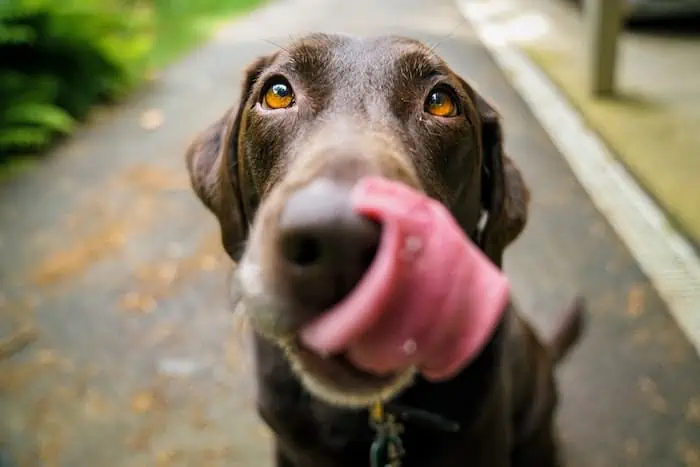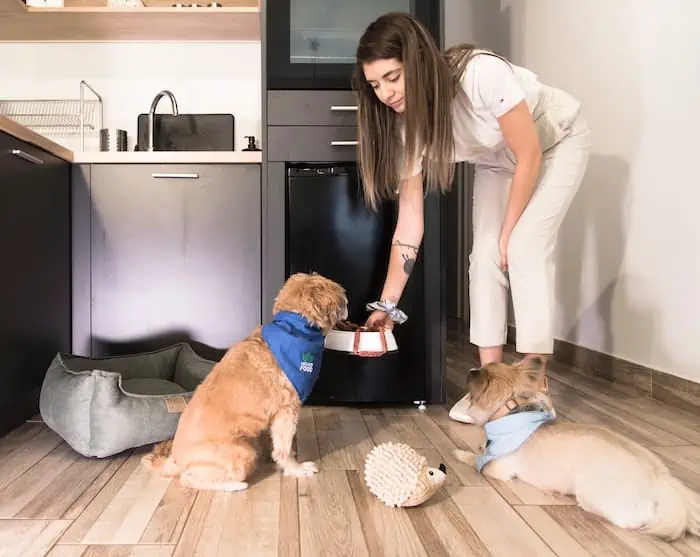6 Reasons Why Dogs Are So Greedy
There’s an old saying about dogs that they’ll eat anything you put next to them, regardless of whether or not they’re actually hungry. Even if there is a bit of truth to this, not all dogs are the same. However, the majority of pups are quite willing to munch from their bowl whenever the impulse strikes them or even snatch up human food that’s been left sitting out and unsupervised. But why do dogs do that? Why are dogs so greedy?
The most likely reasons for your dog’s greediness and need to snatch up available food include genetics (food-obsessive instincts), hunger, excitement, their breed, jealousy of another pet, and rewarded behavior.
However, keep in mind that domesticated dogs are 100% reliant on humans for all of their main needs. “Greedy” is not the appropriate term to use if they are simply hungry or lack any basic requirements from proper health and living. You should keep aware that your pup is only attempting to live, and we are the only resources available to them. So, unless your dog causes absolute chaos about food or shows excessive greediness (which should be addressed by a canine behavioral specialist or veterinarian), never compromise on their diet.
Let’s discuss the reasons for a dog’s greediness in detail.
6 Reasons Why Dogs Are So Greedy
1. Genetics (Food-Obsessive Instincts)
Food is scarce in the wild, so in the past (before domestication), it would have been critical for dogs to take advantage of whatever opportunities they had to eat. That urge is still present in dogs today, and this explains why they will frequently take food from their owners’ hands—or even sneak some off of plates or from the top of the garbage can—when given the opportunity.
2. Hunger
Alternatively, a change in your dog’s nutritional needs or daily food may have made them more hungry. This is more likely to occur and be the reason for food greediness if your dog has started acting in this manner after you began feeding him or her differently or they’ve had something to occur that might impact their nutritional needs.
3. Excitement
The excitement of a meal may also arouse their greediness. Most dogs are absolutely thrilled when they are given a meal, so they sometimes become uncontrollable, especially if it is a dish they enjoy.
On the other hand, if your pooch appears overly excited in a non-typical manner, it might indicate that he is really hungry moreso than he should be.
Make sure you keep an eye on feeding times, and don’t forget to feed your dog consistently, especially if he or she is a young puppy. Because puppies develop at such a quick rate, they are typically much more hungry than adult dogs who may only need to eat about twice a day.
4. Breed
The level of food-related greediness in canines is also dependent upon their particular breed. Some breeds—such as pugs, English bulldogs, and many others that are notorious for snatching up all available food—are more greedy than others.
5. Jealously Towards Another Pet or Human
Alternatively, it is also possible that your dog feels envious of another pet or human. This is more likely to occur if your dog has become greedy after you have acquired a new pet, begun to devote more attention to a new pet, or had a new baby. They’ll take whatever they can get from you, and in some cases, this logic is applied to the food you provide for them.
6. Rewarded Behavior
Sometimes, it is possible that your dog has discovered that their greedy food-devouring behavior is rewarded when you refill his or her bowl or provide additional treats because they seem so hungry. When coming to this conclusion, your dog will try to continue to gain even more food. If this behavior persists, it can become a difficult habit to handle.
Difference Between Greed and Hunger

When running out of your dog’s usual food or making a change to his or her diet for another reason, it is entirely possible that you will accidentally provide your dog with a lesser feed than what he or she actually needs. If you do this continually, you will end up with a dog who acts obsessed with food and for a good reason: their nutritional needs aren’t being met!
If you are not already serving your dog according to the instructions on the dog food packaging, please begin doing so immediately.
Alternatively, if you are not sure how much and what exactly to give your dog for its meals in general, you may need to visit your veterinarian or a canine dietician for advice. A canine dietician should be able to determine your dog’s energy requirements and provide you with an estimate of how much you wil need to feed him or her daily.
It is a fact that every dog is a little bit different from another. If you are feeding your dog the recommended quantity each day, you can experiment with increasing that amount gradually to observe how it impacts his food greediness or hunger indicators.
A clearly visible ribcage is the main warning indicator that suggests that you’re not giving your dog enough food after all.
While having a somewhat visible ribcage is okay and even healthy in most cases, having a ribcage that is too pronounced is considered problematic. Try to put your hand on your dog’s ribs, if this is a concern for you. Generally speaking, you should be able to feel a dog’s ribs very readily. However, if you are able to feel the whole shape of the rib, this is a warning indicator of your dog being malnourished.
On the other hand, if you are unable to feel your dog’s ribs when checking their midsection, it is possible that you have overfed your dog and they have become overweight.
Medical Issues That Lead Your Dog to Be Hungry
If there have been no evident and significant changes in the home recently, the most likely cause of your dog’s increased appetite is a physical or medical ailment.
Dogs who have a sudden surge in appetite may be suffering from a variety of medical issues, some of which include the following:
- A reaction to a medication
- Diabetes
- Aging
- Exocrine pancreatic insufficiency
- Bacterial overgrowth in the gastrointestinal tract
- Hyperthyroidism
- Cushing’s-like disease
In many of the conditions listed above, the fundamental process that causes excessive hunger is the same: your dog’s body would be unable to digest and absorb nutrients efficiently, causing their desire to consume food to go into overdrive. It doesn’t matter how much food they consume when these conditions are present; they will remain truly hungry, so they adjust to this by simply eating everything.
Top 9 Greedy Dog Breeds

Some dog breeds just can’t seem to get enough of anything to satisfy their intense wants—and this especially applies to food! Here is our list of the top 9 greedy canine companions that require more and more and more:
- Rottweiler
- English Bulldog
- Labrador Retriever
- Dachshund
- Cavalier King Charles Spaniel
- Pug
- Cocker Spaniel
- Basset Hound
- Beagle
If you have one of these dogs in your home, you can expect to have your pup often be a total pig about food, treats, attention, and everything else you can possibly offer.
What Can You Do to Encourage Your Dog to Quit Being Greedy?
You can do the following things to try to stop your dog from being so greedy and obnoxious:
1. Make your dog’s mealtimes more fun or challenging
What is the difference between your dog being legitimately hungry and simply being bored and trying to munch away excitedly and playfully? It’s important to remember that your pet may find play to be just as enjoyable as eating.
If your pet appears to be in need of stimulation, why not engage him or her in some complex feeding fun? Feeding your dog with interactive toys or puzzles can slow down their intense eating further and make it more enjoyable for the pup.
2. Use a slow-release feeder
If your dog is a voracious eater, consider purchasing a slow feeder to supplement all or part of his or her daily intake. These slow-release feeders are available in various sizes and shapes to accommodate dogs of all types. They are meant to slow down the pace of ingestion and extend mealtimes to improve your dog’s digestive health and eating habits.
Initially, keep an eye on your dog to ensure that he does not become frustrated and take those frustrations out on the new dog food machine.
3. Try wet food
Consider including a portion of wet food in your dog’s diet. It is lower in calories than dry food and has a greater moisture content. This is a fantastic approach to enhancing the filling quality of your dog’s food without surpassing your dog’s nutritional requirements. Wet food sits better in their stomachs and provides that sensation of fullness far better than eating a large bowl of dry dog food, so even a sneaky trick like wetting their dry food before giving it to them can provide the illusion of increased fullness sensations and lower their greedy, gluttonous habits.
4. Use the food ‘soaking’ approach
As just mentioned, prepare your dog’s dry food by soaking it before serving. This will cause it to “grow” by absorbing the liquids—which also makes it easier for you to also place any in certain feeding toys—and makes the food avoid being eaten too quickly. There are even more advantages to soaking dry kibble as well, such as improved digestion and hydration for your furry companion.
FAQs
1. What is the best way to tell whether a dog is overeating?

When a dog’s digestive movement is regular in the morning but mushy in the evening, this is a fairly typical indicator of overeating. While certain breeds tend to be more susceptible to gas than others, encountering regular gas that is out of the norm in terms of scent typically indicates that something isn’t quite okay in their digestive systems.
2. How many meals should a dog consume in a day?
The quantity of meals a dog consumes in a day is entirely dependent on the family’s daily schedule. Canine companions typically should consume at least two meals each day, spaced at around 11 to 12 hours apart. If they go more than 14 hours without eating, their stomach may become hyper acidic, and this can cause nausea and vomiting.
3. What is the best method to appease a hungry dog?
Creating a schedule around your dog’s appetite is one of the best ways to do this. For example, if you notice that he or she is usually hungriest at night but not as hungry in the mornings, you might consider feeding a larger meal at dinnertime or even splitting the nightly food into two meals, such as one earlier in the afternoon and one at usual dinner time.
4. Is it true that worms make dogs hungry?
Yes. Dogs that are infected with worms frequently either lose their appetites or experience an unexpected surge in hunger. Weight loss attributed to the parasitic infection may continue even though your dog’s appetite may have been stimulated by the increased activity level. Your dog’s appetite should be checked by a veterinarian as soon as possible, along with checking for a worm infestation, if he or she shows any signs of significant changes in hunger levels or symptoms of having contracted worms.
See Also:
Can Dogs Eat Fruit Roll-Ups? Detailed Explanation
10 Reasons Why Random Dogs Come Up to You
Can Dogs Eat Nopales? Read This Frist!
How Long Can a Dog Swim Before Drowning?

Family Dog Expert Author
Hi there! I’m Stuart, a devoted dog lover and family dog expert with over a decade of experience working with our furry companions. My passion for dogs drives me to share my knowledge and expertise, helping families build strong, loving bonds with their four-legged friends. When I’m not writing for SirDoggie, you’ll find me hiking, playing with my beautiful dog, or studying music.
